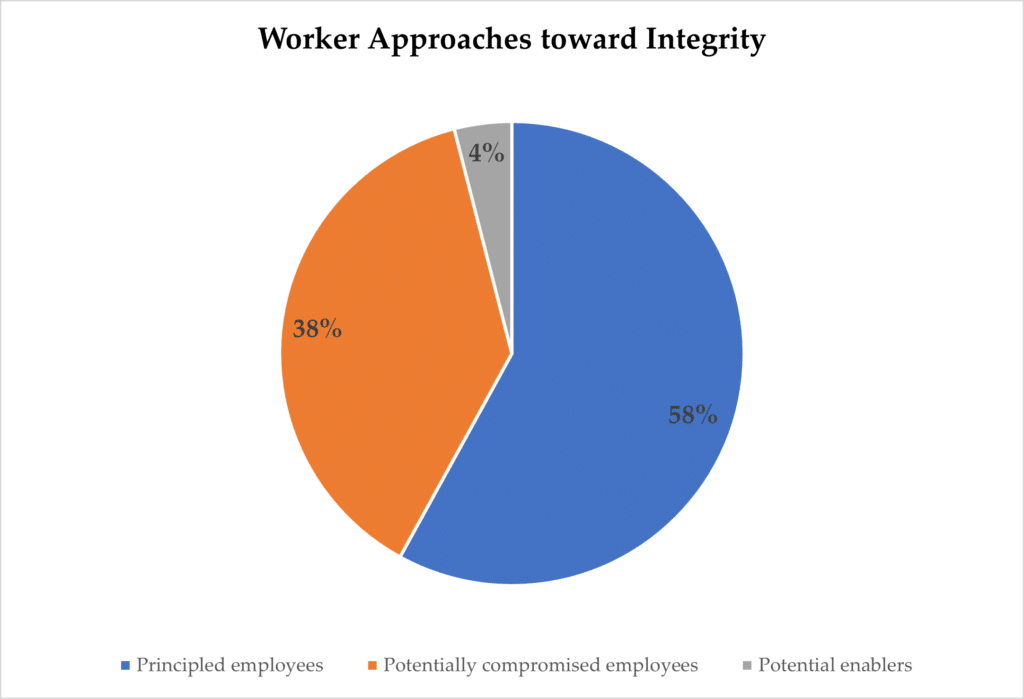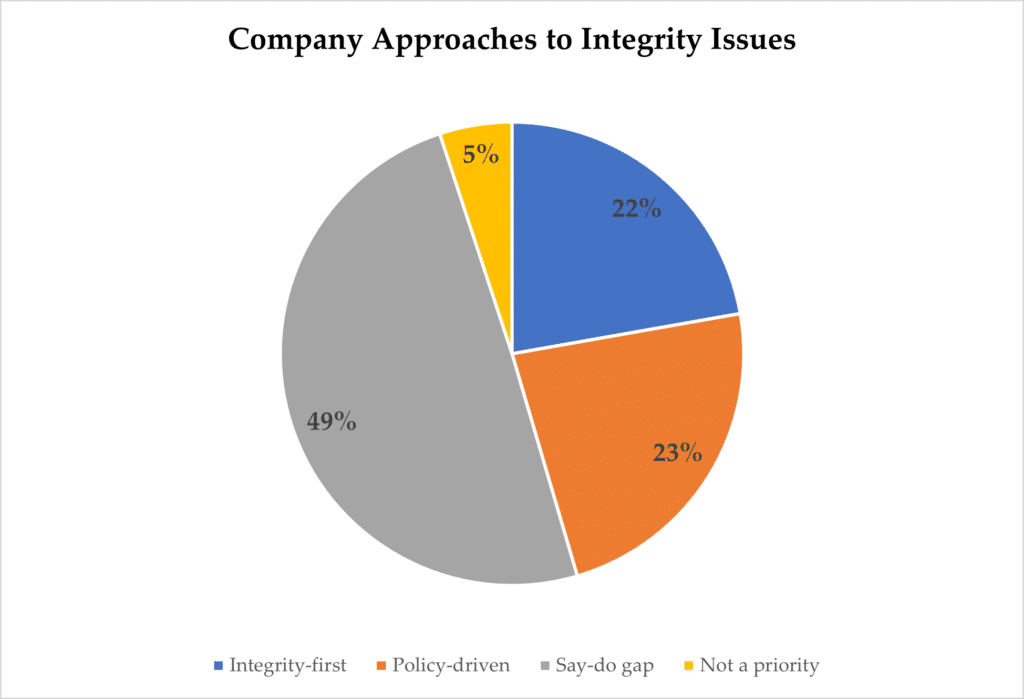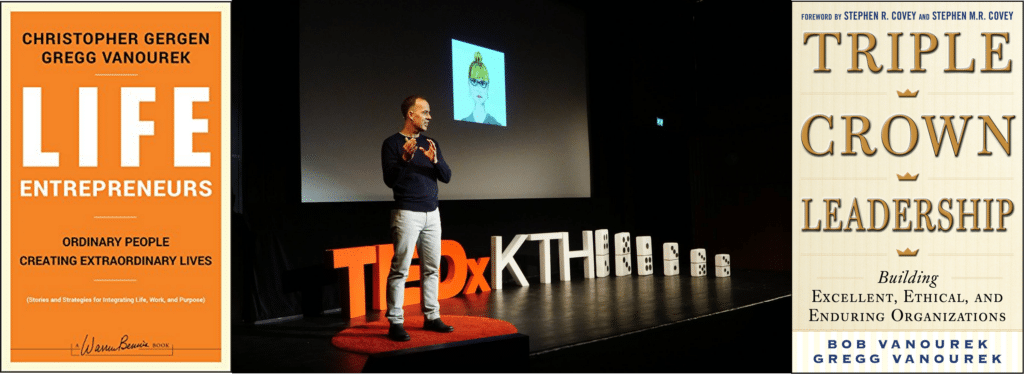Since we’re living in a time of declining trust and confidence in organizations and institutions of all kinds, from Congress and the medical system to televised news and the Supreme Court, it’s fair to ask how we’re doing with business ethics.
How prevalent are companies that operate with integrity? What’s the extent of unethical and illegal behavior? How does the picture look not just at the organizational level but also at the individual level, with workers, managers, and board members?
Unfortunately, the picture is bleak.
The EY Global Integrity Report 2024 is based on a survey of more than 5,000 board members, senior managers, managers, and workers in a sample of large organizations and public bodies in 53 countries and territories around the world. (1) Here are some of its key findings on business ethics around the world and the prevalence and causes of integrity problems:
- 21% of respondents admit that their organization “has had a significant integrity incident, such as a major fraud, data privacy and security breach, or regulatory compliance violation in the last two years.”
- Of those reporting that their organization experienced an integrity incident, 25% attribute the root cause to a lack of appropriate tone from senior leadership and 20% reported pressure from management.
How does it look when it comes to individual workers? According to that same report:
- 38% of respondents “admit they’d be prepared to behave unethically in one or more ways to improve their own career progression” or compensation.
- 38% of respondents “say they’d be willing to behave unethically if asked by a manager.”
- 31% of workers indicate that unethical behavior is tolerated when senior staff or high performers are involved.
Not surprisingly, these issues are pervasive throughout organizations, affecting not just workers and managers but also board members and the senior management team:
- 65% of board members and 57% of senior management feel under pressure not to report misconduct, versus 50% of workers.
- “…in the last two years, 43% of board members have had concerns about misconduct within their organization that they chose not to report (versus 19% of employees).”

Leadership Derailers Assessment
Take this assessment to identify what’s inhibiting your leadership effectiveness. It will help you develop self-awareness and identify ways to improve your leadership.
Worker Approaches toward Integrity and Unethical Activities
How do workers approach issues of integrity, unethical practices, and illegal activities?
Based on a deeper analysis of the data, the report authors suggested that workers’ approaches toward integrity and unethical or illegal activities can be divided into three main types:
- About 58% of workers are “principled employees” who are unwilling to act unethically for personal gain or at the request of a manager.
- About 38% of workers are “potentially compromised employees” who are willing to act unethically for personal gain or at the request of a manager.
- About 4% of workers are “potential enablers” who are willing to act unethically at the request of a manager but wouldn’t do so for personal gain.
See the chart below.


Personal Values Exercise
Complete this exercise to identify your personal values. It will help you develop self-awareness, including clarity about what’s most important to you in life and work, and serve as a safe harbor for you to return to when things are tough.
Company Approaches to Business Ethics and Integrity Issues
How do things look at the company level?
The authors concluded that companies take one of four different approaches to their culture when it comes integrity issues:
- “Integrity-first”: In about 22% of companies, management speaks often about the importance of integrity and puts programs and policies in place to create an integrity culture.
- “Policy-driven”: In about 23% of companies, management takes a policy-driven approach, with a range of programs and policies to boost integrity and meet compliance obligations, but without fully embracing the integrity-first mindset and approach noted above.
- “Say-do gap”: In about 49% of companies, executives speak often about integrity but don’t back up their words with actions by implementing ethics programs and policies.
- “Not a priority”: In about 5% of companies, the organization doesn’t prioritize the promotion of integrity at all.
See the chart below.

“In my experience, most organizations state high or theoretical values for public consumption and then privately ignore them. Tyco’s values, as it practiced historic grand larceny, were integrity, excellence, teamwork, and accountability.”
-Gus Lee, Courage: The Backbone of Leadership
Conclusion
Lots of data points here on business ethics. What story do they tell? Alas, a sad one.
A fifth of organizations have had a significant integrity issue in the last two years. Nearly two-fifths of global workers report being willing to act unethically if asked by a manager. Almost two-thirds of board members report feeling pressure not to report misconduct.
More than four in ten workers are estimated to be potentially compromised employees or potential enablers of wrongdoing. More than half of companies are assessed to speak often about integrity or values but fail to back up their words with actions like implementing ethics programs and policies or to not prioritize integrity at all.
These aren’t isolated data points. Again, we see it show up in declining trust. According to 2024 Gallup data, for example, when people were asked how much confidence they have in big business:
- 6% said a great deal
- 10% said quite a lot
- 42% said some
- 41% said very little
Not exactly a ringing endorsement.
The picture is clear here. Is it good enough for the workplaces where we spend so much time and energy, and where our family, friends, and colleagues work?
We can and must do much better.
–Gregg Vanourek
Tools for You
- Leadership Derailers Assessment to help you identify what’s inhibiting your leadership effectiveness
- Personal Values Exercise to help you determine and clarify what’s most important to you
- Alignment Scorecard to help you assess your organization’s level of alignment

Leadership Derailers Assessment
Take this assessment to identify what’s inhibiting your leadership effectiveness. It will help you develop self-awareness and identify ways to improve your leadership.
Related Articles & Resources on Business Ethics & Ethical Leadership
- “Ethical Leaders: What They Do that Others Don’t”
- “How Ethical Leaders Approach Decision-Making”
- “Leadership and the Ethics Imperative”
- “Why Are We Talking about Ethics?”
- “The Ethical Challenges Faced by Leaders”
- “How to Find a Great Organization to Work For”
- “The Importance of Credibility in Leadership”
- “The Importance of Trust in Leadership”
- “Are You Strong Enough to Be a ‘Voice of One’?”
- “Ethical Decision-Making: Simple Tests”
- EY, “How Can Trust Survive without Integrity?” EY Global Integrity Report 2024, EY Forensic & Integrity Services
- Bob and Gregg Vanourek, Triple Crown Leadership: Building Excellent, Ethical, and Enduring Organizations (esp. Chapter 1)
Postscript: Inspirations on Business Ethics & Ethical Leadership
- “Ethical behavior is tested most under duress.” -Gregg and Bob Vanourek, Triple Crown Leadership: Building Excellent, Ethical, and Enduring Organizations
- “Corporate integrity and trust are the foundations upon which business excellence sits.” -EY Global Integrity Report 2024
- “It’s easier to hold to your principles 100 percent of the time than it is to hold to them 98 percent of the time.” -Clayton Christensen, author, academic, and business consultant
- “An ethical leader is someone who lives and dies for integrity. The ethical leader’s mantra is doing the right thing, even when it hurts.” –Heather R. Younger, author, founder, and CEO, Employee Fanatix
- “The obligation of accepting a position of power is to be, above all else, a good human being.” –Peter Block, Stewardship
- “Ninety percent of all leadership failures are character failures.” -Stephen R. Covey, author, executive, and teacher
- “When asked what contributes most to ethical behavior in your organization, the most frequent response from employers—managers and individual contributors at every hierarchical level—is ‘the behavior of my boss.’” -James Kouzes and Barry Posner, A Leader’s Legacy
- “Most of us think that the important ethical decisions in our lives will be delivered with a blinking red neon sign: CAUTION: IMPORTANT DECISION AHEAD… The problem is, life seldom works that way.” -Clayton Christensen
- “What shall it profit a man if he shall gain the whole world, and lose his own soul?” -Mark 8:36
- “…much of what goes wrong isn’t caused by bad people doing bad things; it’s caused by good people doing bad things without knowing that they’re doing something bad. We have many optimistic illusions about ourselves, and we tend to behave unethically in ambiguous contexts. So when ethical lapses occur, they rarely happen in situations when what is right versus what is wrong is clear. They more typically occur when what is morally right is less clear, such as ‘doing what is right versus loyalty to the organization,’ or ‘doing what is right versus doing what I was told to do,’ or some other context that causes confusion.” –Dr. Max Bazerman interviewed by Jennifer Robinson in “Evaluating Your Business Ethics,” gmj.gallup.com, June 12, 2008
- “I also have asked every Salomon employee to be his or her own compliance officer. After they first obey all rules, I then want employees to ask themselves whether they are willing to have any contemplated act appear the next day on the front page of their local paper, to be read by their spouses, children, and friends, with the reporting done by an informed and critical reporter. If they follow this test, they need not fear my other message to them: Lose money for the firm, and I will be understanding; lose a shred of reputation for the firm, and I will be ruthless.” -Warren Buffett, chairman of Salomon Inc., opening statement before the Subcommittee on Telecommunications and Finance of the Energy and Commerce Committee of the U.S. House of Representatives
- “I didn’t set out to commit a crime. I certainly didn’t set out to hurt anyone. When I was working at Enron, you know, I was kind of a hero, because I helped the company make its numbers every quarter. And I thought I was doing a good thing. I thought I was smart… but I wasn’t.” -Andrew Fastow, former CFO, Enron
- “The words ‘leader’ and ‘follower’ bring to mind a common script in which the leader is in charge, saying, ‘You do this, and you do that.’ Meanwhile, followers are imagined as inferior beings in need of the leader’s direction. We need to rethink this outdated script…. Followers have to keep leaders and peers ethically and legally in check. Instead of viewing followers as the ‘good soldiers’ who carry out commands dutifully, we need to view followers as the primary defenders against toxic leaders or dysfunctional organizations…. Followers cannot abdicate their courageous conscience by outsourcing it to the leader.” –Robert E. Kelley, “Rethinking Followership” in Riggio, Chaleff, and Lipman-Blumen, The Art of Followership (Jossey-Bass, 2008)
(1) The EY Global Integrity Report 2024 is based on a survey of 5,464 board members, senior managers, managers, and workers in a sample of large organizations and public bodies in 53 countries and territories across the Americas, Asia-Pacific, Europe, the Middle East, India, and Africa. Ipsos, a global research agency, conducted the interviews through online panels between October 2023 and January 2024.

Triple Crown Leadership Newsletter
Join our community. Sign up now and get our monthly inspirations (new articles, announcements, opportunities, resources, and more). Welcome!
+++++++++++++++++++++++
Gregg Vanourek is a writer, teacher, and TEDx speaker on leadership and personal development. He is co-author of three books, including Triple Crown Leadership: Building Excellent, Ethical, and Enduring Organizations (a winner of the International Book Awards written with his father, Bob Vanourek) and LIFE Entrepreneurs (a manifesto for living with purpose and passion written with Christopher Gergen). Check out his Leadership Derailers Assessment or join his rapidly growing community. If you found value in this, please forward it to a friend. Every little bit helps!


